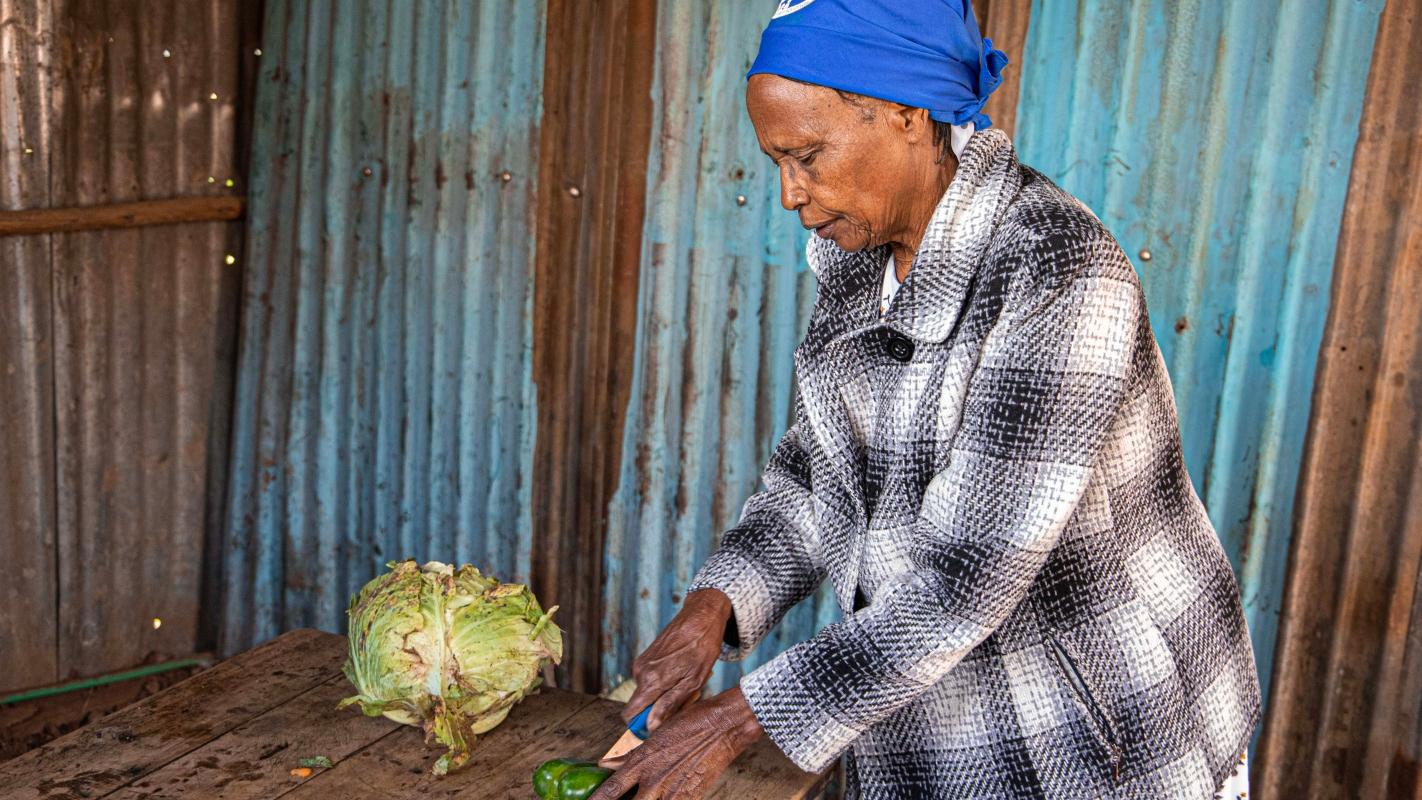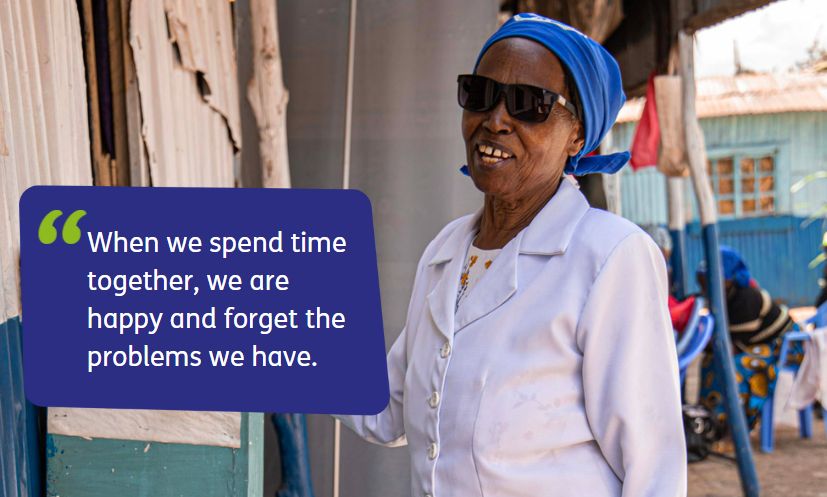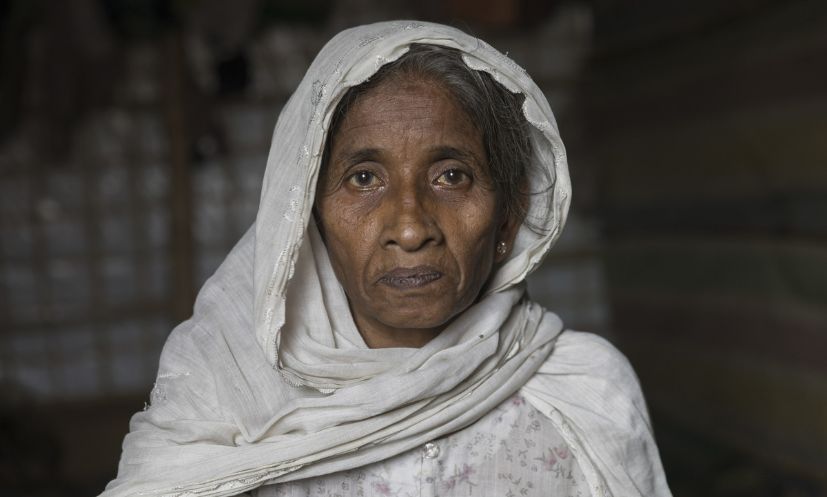Understanding and challenging ageism and abuse
On World Elder Abuse Awareness Day our Parliamentary Officer, Katie Jakeman, answers the question "What is elder abuse?" and explains how we can all take action to help put a stop to ageism and abuse.

In Kenya last year I met Milka, 85, while visiting our local partner KARIKA. When we arrived, she was busy helping to prepare the KARIKA centre for an older people’s group meeting, tidying the kitchen and chopping vegetables. But when we spoke, Milka told me of the abuse she has experienced from one of her sons, who is a drug addict. He still lives at home and harasses her daily, including selling a house she bought for him and taking the money. While she has tried to report it, these forms of domestic abuse are often overlooked by the authorities in Kenya. Unfortunately, Milka’s story is not rare, and thousands of older people experience abuse across the world.
The 15 June marks World Elder Abuse Awareness Day. The World Health Organisation defines elder abuse as ‘a single or repeated act, or lack of appropriate action, occurring within any relationship where there is an expectation of trust, which causes harm or distress to an older person’.
Elder abuse can happen at home, in communities, and within institutions intended to care for older people. Ageist attitudes can facilitate it, with the assumption that older people have less value in society and therefore do not have the same rights as others.
COVID-19 exposed the level of ageism, as governments implemented policies that led to many avoidable deaths in care homes around the world. Rates of elder abuse also increased as there was further strain on services, and stay-at-home orders put older people at greater risk of abuse, neglect, or isolation. But this was not a new issue and even before the pandemic, the World Health Organization (WHO) estimated that almost one in six people aged 60 years and older had experienced some form of abuse.
How elder abuse is perpetuated
Elder abuse is a problem across the world, but unfortunately does not receive the attention it needs from governments and authorities, and a lack of data on older people underrepresents the scale of the issue. With global population ageing set to increase the number of older people by 38% between 2019 and 2030, the rates of elder abuse will also increase unless action is taken.
Globally, there is no agreed definition of elder abuse or what constitutes ‘old age’, which contributes to a lack of understanding of violence, abuse and neglect experienced in later life. It can include physical, sexual, psychological, and emotional abuse; financial and material abuse; abandonment; neglect; and serious loss of dignity and respect.
Elder abuse is particularly significant for older women. According to UN Women, 34% of women aged 60 and over reported experiencing violence or knowing someone who has, since the beginning of the pandemic. Social norms can create barriers to reporting for all women, who might feel obligated to stay in an abusive situation due to the stigma of leaving and notions of being a ‘good mother’, but older women in particular may lack the confidence to speak out and may not have the knowledge of available services. For example, older women interviewed by HelpAge International in Moldova in 2020 viewed the violence they have experienced as something they deserve and thought seeking help would be futile.
Halima, 50, a Rohingya refugee in Bangladesh who fled Myanmar with her four daughters.
Heightened risks during humanitarian crises
During times of conflict, older people can also be particularly vulnerable. Older people often do not want to or are unable to leave when conflict breaks out, often being left behind while younger people flee to safety. In Ukraine, there have been shocking reports of sexual violence being committed against women of all ages by advancing forces. Women make up two-thirds of those aged over 65 and 71% of those aged above 75 in Ukraine, often living by themselves which places them at greater risk of violence and abuse.
Even when they choose to leave their home, older refugees and asylum seekers, stateless persons, and older people displaced from their homes by conflict and emergencies are at heightened risk of exploitation. Humanitarian workers are in positions of power, which can allow abuse to happen against displaced older people with no accountability.
The power of communities
For Milka, being part of an Older People’s Association (OPA) in Kenya has helped her deal with the abuse she faces at home. OPAs are community groups that support older people with healthcare, exercise, and income generation, and give guidance on advocating for rights. Members of the OPAs said that these groups are helping them find solutions to the abuse and violence they face and are enabling them to stay healthy. Not only was Milka able to receive free cataract surgery to restore her sight and with it her independence, but she said that connecting with her peers at the OPA means she can keep herself busy and forget about the problems she is having at home. OPAs are providing services that enhance older people’s quality of life and support them to live independently and with dignity. An Age International-funded project in Kenya was able to facilitate the expansion of these OPAs to reach more older people and included advocacy with the Kenyan government to protect and advance the rights of older people within national policies.

Services, referral systems and programmes also need to be improved to respond to cases of elder abuse. For example, in Moldova, older women and persons with disabilities have been recognised as being at risk of gender-based violence during the pandemic, and so programmes that explicitly target these groups have been set up by the government. A referral process from health services has been established for older women who have experienced gender-based violence, and shelters have adapted their services to the needs of women with disabilities. Moldova should serve as an example to other governments in their recognition of the specific risks older women face. Age International has also funded legal and counselling services through community safe spaces for older Ukrainian refugees being hosted in Moldova.
More on the power of communities
By bringing healthcare education and services into the community, for example through Older People’s Associations, those most in need of health support can access it. Read more in our report.
Taking action against elder abuse
As individuals, we also need to challenge ageism when we see it. Age-based stereotypes, such as the assumption that all older people are ‘frail’ removes their agency and independence. Authorities should be taking older people seriously rather than seeing them as a ‘nuisance’ and providing accessible services for them to report any abuse. The loss of support networks and social isolation can make it harder to expose neglect and abuse, so it often remains invisible, but OPAs and other community groups provide a lifeline of support for older people.
At a broader level, national and international policies need to recognise and take action on elder abuse. The UK’s Foreign, Commonwealth and Development Office (FCDO) Women and Girl’s strategy, published in March 2023, placed ending gender-based violence as one of its three key priorities. This is a welcome commitment, but there were missed opportunities to ensure women of all ages are included.
Unfortunately, most government policies are repeatedly excluding age as a risk factor for abuse. A UN Convention on the rights of older people would provide a definitive, global statement that older people have the same right to freedom from violence, abuse, and neglect as anyone else.
 Katie Jakeman joined Age International in July 2021 as the Parliamentary Officer. She provides political and parliamentary monitoring, research, and advice to a range of stakeholders and promotes the charity's work to political and parliamentary audiences by delivering a range of impactful activities.
Katie Jakeman joined Age International in July 2021 as the Parliamentary Officer. She provides political and parliamentary monitoring, research, and advice to a range of stakeholders and promotes the charity's work to political and parliamentary audiences by delivering a range of impactful activities.
Katie completed a master’s in International Peace and Security at Kings College London and has previous experience with the United Nations Association UK, the student-run refugee charity SolidariTee, and the Westminster think tank Reform.
Our work on protecting older people's rights
All women and men should have their rights protected in older age, on an equal basis with others. We believe a UN convention on the rights of older persons is essential for older people to fully enjoy their rights.

